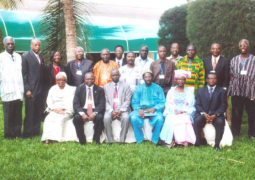According to The Holy Quran and the Prophetic traditional teachings Sawm [Islamic Fasting] has a unique moral, spiritual and social characteristic. Sawm literally means “Abstinence” But in the jurisprudential contacts, it means (Total abstinence from all sexual and food desires from dawn to sunset with the intention of Ibadan). This includes all kinds or related to food like cigarettes and any thing relate to sexual intercourses, before the break of the dawn till sunset, during the entire month of Ramadan, the ninth month of the Islamic year.
This Ibadan [Fasting] is one of Islamic pillars and compulsory for all Muslims, except for children below the age of puberty, the very old, the permanently sick, and so on. It also may be temporarily exempted for some excuses like pregnancy, lactation, menstruation, blood of childbirth, illness, and journey. All of them are allowed to postpone their fasting until the end of their excuses.
When Islam introduced this matchless institution, it planted an ever growing tree of infinite virtue and invaluable products. To make the point more specific let us discourse each of the three aspects as mentioned before:
A) Spiritual Objectives of Islamic Fasting:
Fasting is usually combined with additional prayer, mediation, reading and translating the Holy Quran and this combination helps in:
1. Closeness to and consciousness of Allah.
The Quran says:
O you who believe! Observing As- Sawm (the fast) is prescribed for you as it was prescribed for those before you, that you may become Al-Muttaqun (the pious believers of Islamic monotheism who fear Allah much (abstain from all kinds of sins and evil deeds which He has forbidden) and love Allah much (perform all kinds of good deeds which He has ordained).
Observing Sawm for a fixed number of days, but if any of you is ill or on a journey, the same number (should be made up) from other days. And as for those who can fast with difficulty, (e.g. an old man), they have (a choice either to fast or) to feed a Miskin (needy person) (for every day missed). But whoever does well of his own accord, it is better for him. And that you fast is better for if only you know.
The month of Ramadan in which was revealed the Quran, a guidance for mankind and clear proofs for the guidance and the criterion (between right and wrong). So whoever of you sights (the crescent on the first night of) the month (of Ramadan i.e. is present at his home), he must observe Sawm (fast) that month, and whoever is ill or on a journey, the same number [of days which one did not observe Sawm (fast) must be made up] from other days. Allah intends for you ease, and He does not want to make this difficult for you. (He wants that you) must complete the same number (of days), and that you must magnify Allah [i.e.to say Takbir (Allahu Akbar; Allah is Most Great)] for having guided you so that you may be grateful to Him.
How dose fasting helps us to attain Taqwa. (Consciousness of Allah)? Fasting is a denial of the body’s physical needs. The body sends us signals that it wants food and water. We feel hungry and thirsty. The stomach is uncomfortable. The mouth is dry. At some stages of the day we may feel weak. It is within our power to remove these discomforts by eating or drinking, openly or secretly. But the discomforts also remind us that we are fasting in full obedience to Allah. He sees us wherever we are so there is no “secret” eating. He knows our intentions so there can be no “accidentally-on-purpose” swallowing of water during ablution.
The sincerity of a Muslim’s Imam (faith) is thereby tested many times a day while fasting. Every time he succeeds on overcoming the urge to eat or drink he weakens the domination of his own body over his mind, and strengthens his link with Allah.
With this daily experience of remembering Allah and submitting our wills to Allah there grows a greater closeness to Him. We are more ready to submit to Him in other aspects of our lives. We remember Him when we have to take moral decisions. This is what is meant by having “Taqwa” (consciousness of Allah). It helps us to take the right decisions even though this may involve temporary inconvenience or hardship.
2. Fasting teaches man the principle of sincere love; because when he observes the fasting he doses it out of deep love for Allah. And the man who loves Allah truly is a man who really knows what love is.
3. It equips man with a creative sense of hope and an optimistic outlook on life; because when he fast he is hoping to please Allah and is seeking His Grace.
4. It imbues man with a genuine virtue of effective Devotion, honest and Dedication and closeness to Allah because when he fast s he dose so for Allah alone
5. It cultivates in man a vigilant and sound conscience; because the fasting person keeps his fast in secret as well as in public. In Fasting, especially, there is no mundane authority to check man’s behavior or compel him to observe the fasting, he keeps it to please Allah and satisfy his own conscience by being faithful in secret and in public. There is no better way to cultivate a sound conscience in man.
6. It is an effective lesson in applied moderation and willpower. The person who observer his Fasting properly is certainly a man who can discipline his passionate desires and place his self above physical temptation. Such is the man of personality and character, the man of willpower and determination.
7. It provides man with a transparent soul to transcend a clear mind to think and a light body to move and act. All this is the never-failing result of carrying a light stomach. Medical instructions, biological rules and intellectual experience attest to this fact.
8. It shows man a new way of wise savings and sound Budgeting; because normally when he eats less quantities or less meals he spends less money and effort. And this is a spiritual semester of home economics and budgeting.
9. It enables man to master the art of mature Adaptability. We can easily understand the point once we realize that fasting makes man change the entire course of his daily life. When he makes the change, he naturally adapts himself to a new system and moves along to satisfy the new rules. This, in the long run, develops in him a wise sense of adaptability and a self-created power to overcome the unpredictable hardships of life. A man who values constructive adaptability and courage will readily appreciate the effects of fasting in this respect.
10. It grounds man in discipline and Healthy survival. When a person observes the regular course of fasting in consecutive days of the Holy Month and in the holy months of the consecutive years, he is certainly applying himself to a high form of discipline and a superb sense of order. Similarly, when he relieves his stomach and relaxes his digestive system, he is indeed insuring his body, not to mention the soul, against all harm that results from stomach overcharge. In this manner of relaxation he may be sure that his body will survive free from the usual disorder and break, and that his soul will continue to shine purely and peacefully.
11. Sympathy with the poor and hungry.
Anyone who has experienced the pangs of hunger while fasting must sympathy with the poor and with homeless refugees to whom hunger is a common experience. During the fasting month it is common express this sympathy by giving out food as and when one can afford it, and this practice is encourage at any tie of the year as an important act of charity. The act of giving food to those in need is made compulsory at the end of the fasting month when Zakatul-Fitr is to given out on behalf of every member of the family of those who have the mean.
12. Unity, Brotherhood and Charity.
The fast of Ramadan helps the Muslims to be aware of their unity. From the moment the new moon is seen, the whole Muslim world enters into the spiritual discipline of fasting. Mutual awareness and mutual sympathy between Muslims is increased. We try doing more acts of charity towards each other. We bear in mind that back-biting gossip, quarrelling and so on can take away the spiritual benefits and reward of our fasting, as shown in a Hadith from Abu Hurayrah in which the Prophet is reported to have said: “if a person does not keep away from falsehood and false conduct Allah has no need of his fast.” (Bukhari). According to another Hadith “If someone tries to pick a quarrel with a Muslim who is fasting he is to control himself and reply “I am fasting.” By all these means Muslims cultivate peace and brotherhood during the holy month. May Allah accept our Ramadan
Read Other Articles In Article (Archive)




